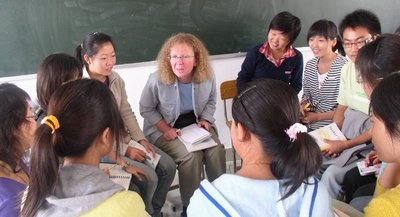January 11, 2007
Teaching in China is her vacation
Denise Anderson’s adventure as a volunteer English teacher in a small village in China’s central Shaanxi Province began when her husband, who was working on a remodeling project, decided he should stay home during their usual September vacation break.
Anderson, who is a senior lecturer in the School of Medicine’s Department of Microbiology, started thinking about what she might want to do on her own. She had read several articles about volunteering in foreign countries as a way to learn about the culture, so she tried keying in “volunteer vacations” on the Google search engine.
She found lots of possibilities. After doing some research on several different organizations, she chose a group called Global Volunteers, based in St. Paul, Minn. They run programs in 20 countries around the world, with various volunteer possibilities.
She ruled out some areas that seemed to have significant health risks and also some volunteer tasks like construction work. Partly through this elimination process, she decided on three weeks in China teaching English. Shortly after she made the decision, a friend decided to join her on the trip.
Part of a group of nine volunteers, Anderson and her friend went to the village of An Shang, about two and a half hours from Xi’an, the city where the famous army of terra cotta warriors is located.
“It was really a great experience for me,” Anderson said. “We were teaching a group of college-age students who came from Xi’an to the village for the conversational English course. We taught every morning, but we also had time to go for walks and spend time informally with the students.”
She was most impressed with the Chinese students’ enthusiasm and desire to learn, not only more about the English language, but about life in America.
“So much of what they see and hear about our country is from films. They wanted to know all about my life — my house, my job, my car, my family.”
The experience teaching conversational English also made her very aware of how difficult it is for non-native speakers to understand all the idiomatic expressions Americans use without even thinking about it.
“A phrase like ‘on the tip of my tongue’ can be really baffling,” she said. “But these expressions are an important part of our conversations.”
The volunteers were in the village of about 1,200, where they stayed in two large houses, during the harvest season. Corn was drying on rooftops, grain was being raked and husks were laid out to dry on the roads.
“Along with doing some good and sharing our culture,” Anderson said, “this was a great way to experience more of the Chinese culture than you would as a tourist. Just living in the village for three weeks gave me a different perspective on the country. I also forged an incredible bond with some of the students — they became like family to me.”
Global Volunteers is an independent organization with “special consultative status” with the United Nations. Volunteers pay a tax-deductible service program fee to cover project and administrative costs. Each team has an assigned leader familiar with the project and the locale. For more on the organization, see their Web site at http://www.globalvolunteers.org.



